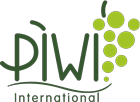The PIWI Canada regional group
Contact for Canada
Every grape grower and winemaker should aspire to have an environmentally friendly, sustainable vineyard that produces quality wines. With PIWI grape varieties and the help of PIWI International, that will become possible. Canada has a long history of strong environmental stewardship, and planting fungus-resistant grape varieties is another step we can take to continue that tradition.
The primary goal of PIWI Canada is to help grape growers and vintners understand the advantages of planting these modern grape varieties. The immediate benefits include improved sustainability and cost reductions from less spraying in the vineyard.
The second goal is to help vineyards access and understand these modern PIWI varieties, and as of 2022, that is now possible. Information on these new varieties (flavour profiles, resistance data, harvest times, cold resistance, etc.) and how they fit into your plans is essential and sharing the information is a substantial benefit to members. There are at least 14 varieties available to Canadian vineyards from France, Germany and Italy, with more on the way.
Become a member of PIWI Canada and help support a new era of sustainable vineyards.
News
Modern European PIWI varieties in Canada
Author: Darcy O'Neil - www.artofdrink.com
There are always risks when growing grapes in Canada. The winter of 2021/22 was brutal in the Niagara region, not just because of the cold temperatures (-26°C in some places) but extended wet periods in the fall, which resulted in upwards of 50% crop loss for 2022 and long- term damage to a significant number of vines. Getting some vineyards back into full production may take 3 to 5 years. Miserable winters are an accepted risk among Canadian grape growers. However, from crisis comes opportunity.
When upwards of 50% of a vine-growing region suffers severe damage, it opens the possibility of reassessing the direction winemakers will take in the future. A genuine opportunity for this region may come with planting the modern European PIWI varieties developed at breeding programs in Germany at the Julius Kuhn Institute, Freiburg University and France's INRA (Institut National de la Recherche Agronomique). France has invested in developing hybrids, because of global warming and for sustainability reasons. Germany has excellent breeding programs that produce vines that are 80% to 90% vinifera. The German government considers these vines Vitis vinifera because they contain only a tiny percentage of non-vinifera species. If Europe is embracing PIWI grapes, then maybe Canada should embrace the benefits of modern PIWI grapevines. The benefits of planting PIWI grapes are significant, and the wine quality is on par with current vinifera varieties.
Global warming has shown that the weather will get more extreme in the coming years. For Ontario, that means a wetter, more humid growing season. And, by extension, more disease pressure from fungus.

